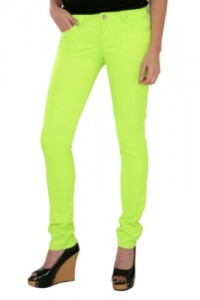Ross Stores: A Cheap Seller of Cheap Goods
A great deal of value investing is the process of elimination. Warren Buffett, when asked how he finds undervalued stocks, simply replied “Start with the A’s.†But in most markets only a small fraction of securities count as underpriced on an absolute basis, so value investing requires wading through an endless sea of crap in search of the delicious low-hanging fruit (yes, in this example fruit comes from the sea). Given my affinity for this mode of investing, how could I not like Ross Stores (ROST)?
 Ross Stores is a discount retailer that sells clothing and home accessories, and gathers much of its apparel through sniping manufacturer overruns and cancelled orders, much as investors would do if they want something on sale. This strategy can acquire some highly desirable and serviceable clothing, but much of Ross’s purchases are not in demand for a good reason (lime green pants, anyone?). How could a value investor not like this business model? For people who like the thrill of the hunt aspect of shopping it creates a fine shopping experience.
Ross Stores is a discount retailer that sells clothing and home accessories, and gathers much of its apparel through sniping manufacturer overruns and cancelled orders, much as investors would do if they want something on sale. This strategy can acquire some highly desirable and serviceable clothing, but much of Ross’s purchases are not in demand for a good reason (lime green pants, anyone?). How could a value investor not like this business model? For people who like the thrill of the hunt aspect of shopping it creates a fine shopping experience.
As you may imagine, Ross has been doing very well at luring customers during a recession. They are on pace to earn $400 million this year, when normally they earn somewhere in the $300 million range. This ability to do well in a recession reminds me of Rayonier or Compass Minerals. I discussed Rayonier as an inflation hedge, with the advantage over gold and TIPS that they can produce a decent return even without inflation. Upon reflection, I believe that Compass Minerals offers the same advantage from its salt and fertilizer. Road salt is a widely used de-icer and is vital in regions that are not so environmentally concerned as to adopt calcium or magnesium chloride, and fertilizer is similarly impossible to do without, so I am convinced that Compass Minerals is also good for an inflationary situation.
Ross is not a hedge against inflation, but the fact that its sales increase when the economy weakens and sales everywhere else tend to decrease, makes it a useful hedge against an economic downturn. Even after this growth, Ross trades at a P/E ratio of 13.6, which has actually been trending down of late. Thus, it does not really produce outsize returns, but its robustness in a recession is attractive. I normally prefer an earnings multiplier of about 10, because I try to avoid overpaying for growth, which often translates to “I try to avoid paying for growth,†and if I can usually find 10 anyway, why depart from it? In fact, if we go by Ross’s more typical historical earnings, at current prices Ross would have a P/E ratio of 18. However, I do feel that Ross is entitled to some premium from its ability to hedge against a downturn, and since they have been opening new stores all the while, at least some of the expansion of sales is here to stay, and not just the temporary influence of thrift.
I should mention, though, that Ross uses share buybacks instead of raising its dividend, and I Â wish they would declare a dividend and be done with it, since it suggests a greater degree of stability and permits all shareholders to benefit immediately from positive cash flows. Certainly a share buyback concentrates the effect of future earnings, but existing earnings have to count for something too.
So, I am convinced that Ross is one of those great companies at a good price that Warren Buffett talks about, but, like Graham, I have always been suspicious of the view that if you get a good quality stock the price will take care of itself (I’ve always thought the reverse was more accurate), and at any rate, the time to hedge against a recession is over; one’s already here. Nonetheless, this king of discount stores comes with a built-in put option on the rest of the economy and should be entitled to a premium for it. And despite what the regulators would have you believe, this is not the last recession we’re ever going to have.
Leave a Reply